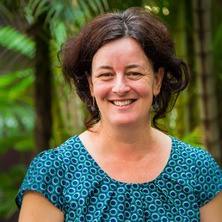CBT@Home webinar series
The importance of social factors in CBT
Associate Professor Genevieve Dingle, The University of QLD

This approx. 57 min CBT@Home webinar was recorded in January 2022. AACBT members can view for free. Non-members may purchase here.
An insight into the social processes of group CBT and other therapeutic groups and communities.
Biographical notes:
My qualifications are a BSc(Hons), BA, and PhD(ClinPsyc) from the University of QLD. I am the Director of the Clinical Psychology Programs and Associate Professor in Clinical Psychology at the University of QLD. I enjoy teaching Masters students courses on Cognitive Behaviour Therapies for Adults, and Addiction Science and Practice. My program of research examines how groups and communities can benefit adults’ mental health and wellbeing. This has included group cognitive behavior therapy for depression and substance use disorders, therapeutic communities for alcohol and drug use disorders, arts-based groups to address loneliness and depression, and social prescribing to community group activities. I convene the interdisciplinary UQ Music, Dance and Health research group, which has a seminar series and collective research outputs. I have authored 123 scholarly publications. My translational research has been recognized with awards such as the AACBT (QLD) Scientist Practitioner Award (2001), APS Theory into Practice Award (2005), and nomination for the UQ Partnerships in Research Excellence Award (2019). I have been a CI on 21 grants worth a total of $1.995 million, including 3 grants from the ARC and an NHMRC equipment grant. I was on the editorial board of the British Journal of Clinical Psychology (2012-2018) and am the Editor-in-Chief of Behaviour Change (2020-on-going).
Genevieve was the 2021 recipient of the AACBT Mid-career Award.
Key Learning Objectives:
- Knowledge of how social factors can influence the effectiveness of group CBT and therapeutic communities for AOD use
- Definition of group identification and understanding its important role in therapeutic and informal groups in determining outcomes such as mental health, wellbeing, substance use recovery, depression, and loneliness
- Preliminary understanding of social prescribing and the Groups 4 Belonging program as interventions for loneliness
- Knowledge of key cognitive barriers that prevent people from joining groups, such as mistrust, fear of negative evaluation, and stigma
Select readings:
-
Cruwys, T., Haslam, S. A., Dingle, G. A., Jetten, J., Hornsey, M. J., Chong, E. M. D., & Oei, T. P. S. (2014). Feeling connected again: Interventions that increase social identification reduce depression symptoms in community and clinical settings. Journal of Affective Disorders, 159: 139-146. http://dx.doi.org/10.1016/j.jad.2014.02.019
-
Dingle, G. A., Stark, C., Cruwys, T. & Best, D. (2015) Breaking good: breaking ties with social groups may be good for recovery from substance misuse. British Journal of Social Psychology, 54: 236-254. https://doi.org/10.1111/bjso.12081
-
Williams, E., Dingle, G. A., Calligeros, R., Sharman, L., & Jetten, J. (2020) Enhancing mental health recovery by joining arts-based groups: A role for the social cure approach, Arts & Health, 12:2, 169-181. https://doi.org/10.1080/17533015.2019.1624584
-
Ingram, I., Kelly, P. J., Haslam, C., O’Neil, O. J., Deane, F. P., Baker, A. L., & Dingle, G. A. (2020). Reducing loneliness amongst people with substance use disorders: Feasibility of ‘Groups for Belonging’. Drug and Alcohol Review, 39(5), 495–504. https://doi.org/10.1111/dar.13121
- Dingle, G. A., Sharman, L., Haslam, C., Donald, M., Turner, C., Partanen, R., Lynch, J., Draper, G., & van Driel, M. (2021) Systematic review of social group interventions for depression. Journal of Affective Disorders, 281, 67-81. https://doi.org/10.1016/j.jad.2020.11.125

